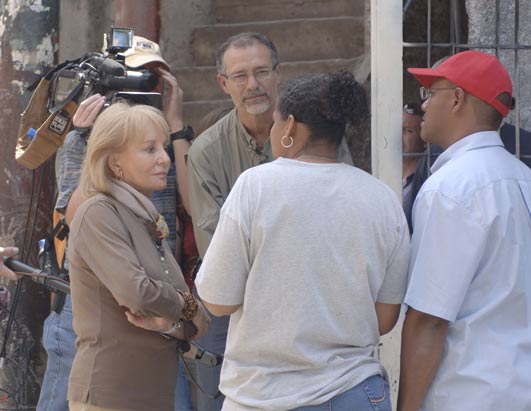What We See in Hugo Chavez... When We Watch 20/20

Today was a very rare day for Venezuelan President Hugo Chavez; He got as much good press as bad in the United States. First I turn on 20/20 amazed to see Hugo chatting it up amiably with Barbara Walters. He got a whole six minutes on US television, though a quarter was Barbara talking to rich brats in a cafe and touring slums that have benefitted from running water, paved streets and better schools. Already it appears the right-wingers are going to try to hang Walters, for using the words "dignified," "passionate" and saying "he's not crazy." What no one seems to have noticed is that Chavez expressed regret and basically apologized for his "name calling" of Bush.
Next I check the NY Times and see am even rarer editorial piece defending the controvertial leader. Check the piece below:
By LUISA VALENZUELA
Published: March 17, 2007 - NY Times
What We See in Hugo Chavez
Buenos Aires - THE fervent welcome that greeted President Hugo Chávez of Venezuela during his visit to Argentina a week ago was inexplicable to some Argentines and left others indignant. Many here tend to mistrust populism and demagoguery, finding them redolent of Peronism. But even among the wary, a window of hope has opened, with Mr. Chávez as its symbol.
...
Unlike the homogenous rallies of Peronist times, the 30,000 people in this crowd came from very diverse backgrounds. In Argentina, the economic crisis of December 2001 significantly altered not only our social dynamic but our semantics. We no longer talk about the “pueblo” — which means town or village as well as people. Now we talk about the “gente,” which also means people, but with a different nuance, derived as it is from the Latin gens meaning race, clan or breed.
The new vocabulary transcends distinctions of class: the middle classes have now merged with the poor to demand their rights. Hence many students and professionals were in attendance that day, not necessarily attracted by the figure of President Chávez himself so much as by the anti-imperialist opportunity he symbolized. We Argentines, who once imagined ourselves more sophisticated, or more European, than the citizens of neighboring states, were brought closer to the rest of the continent by our impoverishment, and we find ourselves more open to the idea of pan-Latin American solidarity.
Perhaps last week’s crowd also recognized the part that President Chávez’s monetary aid played in our recuperation of that illusion known as “national identity.” For Argentina had virtually disappeared as an autonomous country during the presidency of Carlos Menem from 1989 to 1999, the era of our “carnal relations” with the United States, which took the form of spurious privatizations and a fictitious exchange rate.
While many in Argentina would, nevertheless, not hesitate to call the Venezuelan president a clown or a madman, it’s worth keeping in mind that a very heady dose of megalomania is a prerequisite for even dreaming of confronting a rival as overwhelmingly powerful as the United States — which is also led by a president viewed, in many quarters, as a clown and a madman.
President Chávez’s weapons of seduction are his superabundance of petrodollars and his obsession with a shared Latin American project. His plan is to realize the dream of Simón Bolívar, the old utopian vision of Latin American integration that today seems more viable than ever before.
It may be that President Bush chose to venture into these forgotten Southern latitudes to counter that vision. In Brazil, he tried to draw attention to the production of ethanol, an ecologically correct rival to petroleum that nonetheless depletes the earth. And in Uruguay, all Mr. Bush seemed to be trying to do was irritate the other governments of South America by promoting a Free Trade Area of the Americas project in opposition to Mercosur, the southern common market formed in 1991 by Brazil, Argentina, Paraguay, Uruguay and, somewhat later, Venezuela.
These things sometimes backfire. President Bush found himself repudiated on one bank of the Plata while President Chávez was getting ovations on the opposite one: each contender in his corner and the moral triumph to the last man left standing, as in a boxing ring.
...
Two major Argentine characteristics are in play here: intrinsic distrust and the need for immediate gratification. Mr. Chávez awakens both of these inclinations, and it’s interesting to see them balance each other out. The dream of a single-currency Latin American Union, modeled on the European Union, to create, insofar as possible, a buffer against the hegemony of the United States no longer seems so impossible.
I’m no political analyst; I have delved into politics only as a fiction writer. But I’m an optimist by nature, and the feeling of empowerment that President Chávez instills, and that various South American governments are endorsing, strikes me as a good engine for further progress — a means of upgrading ourselves from the status of someone’s backyard into that of a truly autonomous region, beyond Mr. Chávez, Mr. Bush and every other form of demagoguery.
Luisa Valenzuela is the author of “Black Novel With Argentines” and “The Lizard’s Tail.” This article was translated by Esther Allen from the Spanish.
Whole Thing

0 Comments:
Post a Comment
Subscribe to Post Comments [Atom]
<< Home